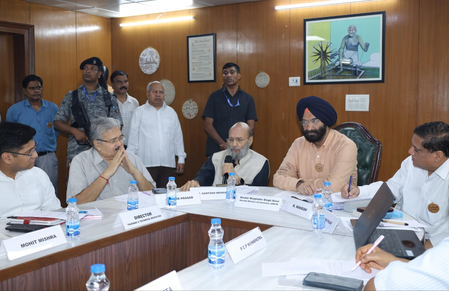
New Delhi, June 17 (IANS) In a step towards reviving traditional industries, Delhi Minister for Industries Manjinder Singh Sirsa on Tuesday discussed strategies with experts for skilling youth and promoting self-employment in villages.
Speaking at a stakeholder consultation on ‘Skill Enhancement for Village Industries’, organised by the Delhi Khadi and Village Industries Board (DKVIB), Sirsa said, “Inspired by Prime Minister Narendra Modi’s vision of Vocal for Local, the Delhi government is making a push to bring Khadi and small-scale industries into the mainstream economy. We are not just reviving a board — we are reviving the spirit of Atmanirbharta rooted in India’s soil.”
“Skilling is our most powerful tool to restore India’s age-old legacy of self-reliant village industries,” said Sirsa.
The consultation, held at the DKVIB headquarters, brought together over 50 stakeholders, including industry experts, young entrepreneurs, artisans, self-help group representatives, and government officials.
The session focused on identifying actionable areas for the revival of the Board and creating scalable models for skilling, self-employment, and market linkages.
“We want to ensure that Delhi’s youth, artisans, and traditional workers don’t just get skilled, but also receive the resources, networks, and guidance to build their own ventures. This is not charity — it’s capacity building, it’s economic transformation,” he said.
The revival of DKVIB is part of Delhi’s broader strategy to align local economic development with national goals of employment generation, sustainable production, and rural empowerment.
With policy momentum, budgetary support, and active stakeholder engagement, the DKVIB is poised to become a vibrant institution once again — a true symbol of ‘Make in India, Made by Locals’, he said.
As part of the new roadmap, DKVIB will soon launch thematic skill-building workshops focused on heritage crafts, natural textiles, leather work, eco-friendly packaging, pottery, and food processing. These workshops will be designed to integrate modern technology, branding strategies, and digital marketing support for artisans and rural producers.
The consultation also explored models for cluster-based micro-industrial development, the introduction of skilling-cum-credit schemes, the creation of incubation centres for rural enterprises, and establishing direct linkages with urban markets through e-commerce platforms.
–IANS
rch/uk



